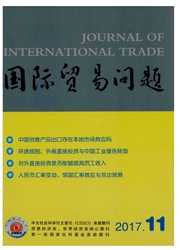

 中文摘要:
中文摘要:
文章采用2002—2006年的中国工业企业数据与海关数据的合并数据,利用Tobit模型考察了融资约束对企业出口的国内附加值率的影响,以及地区金融发展水平对此影响的调节作用。研究发现:(1)总体而言,融资约束和企业出口的DVAR呈倒U型关系。适度的融资约束有利于企业提高国际市场上的竞争意识,加强研发和自主创新,提高其在全球价值链中的地位,尤其在一般贸易企业中作用最为明显。(2)提高地区层面普遍的金融发展水平可以缓解企业进出口的成本压力,促进其在全球价值链中的地位攀升。(3)外源融资约束,比起内源融资约束和商业信贷约束,对企业的竞争压力更大,更容易促进企业攀升全球价值链。
 英文摘要:
英文摘要:
On basis of the merged Chinese Annual Survey of Industrial Firms and transaction-level customs data over the period of 2002 to 2006, we conduct the Tobit model to investigate the effects of firms' financial constraints on their domestic value added rates(DVAR). Furthermore, we consider the role of local financial development plays in the above relationship. We discover that:(1) Overall, the impact of financial constraints on firm DVAR is inverted Ushaped relationship. It indicates that a moderate financial constraint encourages firms to participate in the global market and increase its RD innovation and finally lead to a higher position in the global value chains. This effect is the most pronounced in ordinary trade firms.(2) An improvement in the local financial system releases the firms' tension of trade costs and enhances its DVAR.(3) Outsource financial constraints push firms more than inner-source financial constraints or commercial financial constraints, and bring up their positions in the global value chains.
 同期刊论文项目
同期刊论文项目
 同项目期刊论文
同项目期刊论文
 期刊信息
期刊信息
